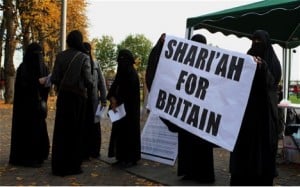This was written by Kevin Healey and originally published on the USC blog Trans/Missions.
Dominique Strauss-Kahn’s religious identity has made news since 1991, when the Jewish Tribune reported that each morning he asks himself how he can be “helpful to the state of Israel.” He should have refuted the quote, he says, since it has only emboldened critics who deride him as “a leading French Jew” and a “devout Zionist.” Such views, coupled with allegations of aggressive womanizing, would surely trouble his political future. Just a few weeks before his arrest on rape charges, he told Liberation that he anticipated three problems for his Presidential bid: “Money, women, and my Jewishness.”
Indeed, after his arrest French officials argued that “the thought of a trap” or “smear campaign” could not be ruled out. Columnists suggested anti-Semitism might be a factor, citing comments from right-wing opponents like the National Front’s Marine Le Pen, who condemned his behavior as “pathological.” Noting the relative lack of concern for Strauss-Kahn’s accuser, The New Yorker’s Philip Gourevitch quipped, “It seemed a good measure of the depth of France’s political malaise that it took a Le Pen to show solidarity with the working woman against the Socialist Party’s favorite son.”
And what about that “working woman”? Mainstream sources offer mostly brief descriptions: She is a 32-year-old, French-speaking immigrant from Guinea, a single mother living with her teenage daughter. Many reports mention her religious background but only in passing, describing her as a “good Muslim,” a “devout Muslim,” who “wears a headscarf.”
But as her neighbors and family invoke her religion in her defense, online discussions seethe with sexism and Islamophobia. At Free Republic, alongside discussion of whether his alleged victim is attractive, one commenter suggests “Strauss-Kahn should insist on Sharia rules. Four male witnesses or it never happened…” Another asks rhetorically, “Would a muslim [sic] lie to bring down one of the most powerful infidels on earth?” Indeed one commenter argues that “the maid might be in the employ of… some Muslim extremist group” that wants exploit escalating tensions by keeping Sarkozy in power.
As media coverage shifts to the rising backlash against the chauvinism of Strauss-Kahn’s defenders, journalists should remember that in France, as in the U.S., sexism is rarely separable from racial and religious prejudice. While journalists rightfully dismiss conspiracy theories from anonymous bloggers, they would do well to heed the insights of scholars and op-ed writers who highlight the relationship between male chauvinism and anti-Muslim prejudice in French culture.
Joan Scott, author of The Politics of the Veil, argues that it is misguided to cite the “headscarf ban” as evidence of French commitment to gender equality, as one columnist does in a retort to Gourevitch’s above-mentioned quip. In fact, French elites have often rejected feminism as a “foreign import,” arguing that women’s power lies in their willing sexual objectification. Proponents of this view see “the sexual modesty implicit in the headscarf as proof that Muslims can never become fully French,” says Scott. Thus the headscarf ban encapsulates both misogyny and anti-Muslim prejudice, not their opposites. “How ironic, then, that the victim of Strauss-Kahn’s alleged sexual assault was a Muslim,” Scott writes.
It is understandable that media coverage should expound on the implications of the demise of Strauss-Kahn, an international figure, for French politics and for Jewish communities around the world. But it would only compound the tragedy of this working woman’s fate if coverage ignores the link between sexism and Islamophobia that his alleged attack has thrown into sharp relief.











